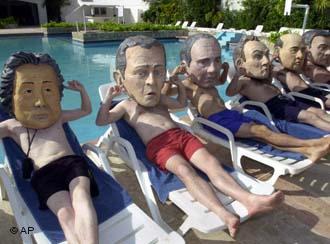It means the Cancun meeting will be all work and no play, if they hope to save the WTO’s Doha round from collapse. A few weeks ago, the National Journal declared that the September gathering is “shaping up as a train wreck.”
Right now, the United States and other exporting countries such as Australia and Brazil are on a collision course with Europe, Japan, and Korea over how quickly to reduce agricultural subsidies and tariffs. The United States has proposed cutting trade-distorting subsidies by $100 billion (to 5 percent of farm production), lowering average tariffs from 62 percent to 15 percent, and eliminating all export subsidies by 2010. The EU countered last December with a much more timid proposal to reduce domestic subsidies by 55 percent, trim tariffs by 36 percent, and shrink export subsidies by 45 percent.
The Europeans also stressed the importance of “non-trade concerns,” such as animal welfare, environmental protection, and rural development. These “non-trade concerns” are not completely without merit, but they’re increasingly used as convenient excuses for reinforcing the traditional market barriers that these trade talks are supposed to phase out. It’s protectionism by another name.
The two sides remained far apart through the March 31 deadline, even as negotiators tried to split differences and make accommodations. Stuart Harbinson, head of the WTO’s agriculture committee, was not able to produce mutually acceptable compromises. He blamed the participants for failing to budge.
No matter who is to blame, the result is not good for those of us who want to see trade barriers crumble–and that includes most American farmers, who export a large portion of what they grow.
“The United States is disappointed, but not surprised, that resistance to change and reform of world agricultural trade stymied agreement on the modalities for cuts in subsidies and tariffs,” said U.S. Trade Representative Robert Zoellick and Agriculture Secretary Ann Veneman, as the March 31 deadline slipped by without a deal.
All is not lost, however, and the way out of this mess is clear. “For the new round to succeed, the major players, the United States and the EU, must contain domestic political difficulties, defuse bilateral conflicts, and cooperate intensively,” writes Razeen Sally in a new report from the Cato Institute. “A Bush administration leading from the front, notwithstanding protectionist blemishes at home, must forge issue-based and across-the-board alliances with market-access-oriented WTO members, especially within the developing world.”
In the two meetings of the Special Ag Committee that are scheduled for June and July, the talk will be about technical issues like export credits and food aid. These are important but not deal killers.
We simply must make progress on the major problems. The obstacles to agricultural trade seem to be about as high as they were at the end of the WTO’s Uruguay round. At a time when the whole world is in economic doldrums, this is an ideal moment to begin removing the artificial barriers that reduce competition and damage prosperity. What’s more, a trade pact might begin to heal the rift between the United States and parts of Europe over the war in Iraq–old allies can show each other that they still have a common interest in boosting trade.
The challenge to reduce agricultural subsidies and tariffs was steep even before the March 31 deadline came and went without a deal on modalities. Now it’s even steeper, and the folks who will attend the Cancun meeting have their work cut out for them.

